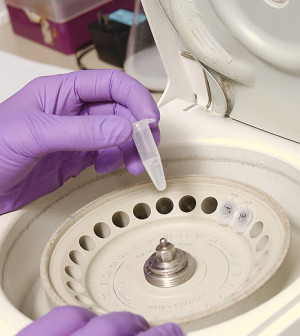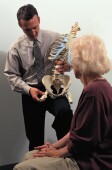- Could Your Grocery Store Meat Be Causing Recurring UTIs?
- Are You Making This Expensive Thermostat Error This Winter?
- Recognizing the Signs of Hypothyroidism
- 10 Strategies to Overcome Insomnia
- Could Artificial Sweeteners Be Aging the Brain Faster?
- Techniques for Soothing Your Nervous System
- Does the Water in Your House Smell Funny? Here’s Why
- Can a Daily Dose of Apple Cider Vinegar Actually Aid Weight Loss?
- 6 Health Beverages That Can Actually Spike Your Blood Sugar
- Treatment Options for Social Anxiety Disorder
Surgery Not Better for Spine Narrowing, Study Finds


Surgery and more conservative treatments provide similar long-term outcomes for people with spinal stenosis, a new study suggests.
Spinal stenosis is narrowing of the spinal canal that leads to back and leg pain and other symptoms.
The study included more than 650 spinal stenosis patients who had surgery or received nonsurgical treatment such as physical therapy or medications. For the first several years, patients who had surgery had better outcomes.
However, after eight years of follow-up, there were no significant differences between the two groups in terms of pain, functioning or disability, according to the study in the Jan. 15 issue of the journal Spine.
Both surgery and more conservative treatments were safe, according to the researchers. Of the patients who had surgery, 18 percent had repeat surgery for recurrent spinal stenosis within eight years, said study leader Dr. Jon Lurie and colleagues in a journal news release. The study authors are from Dartmouth-Hitchcock Medical Center in Lebanon, N.H.
The findings provide important information for patients and doctors when considering treatments for spinal stenosis, the researchers said.
More information
The U.S. National Institute of Arthritis and Musculoskeletal and Skin Diseases has more about spinal stenosis.
Source: HealthDay
Copyright © 2026 HealthDay. All rights reserved.










